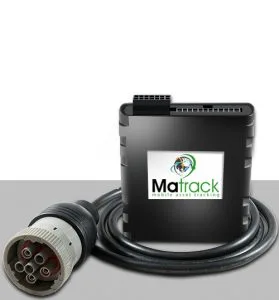Key Takeaways:
- A logbook is a written or digital record used to track activities, events, and tasks with time-stamped accuracy.
- Electronic logbooks for truckers automatically log Hours of Service (HOS) and vehicle data for FMCSA compliance.
- Logbooks improve safety, reduce violations, and can help lower insurance costs by maintaining clean driver records.
- Matrack offers a free, easy-to-install ELD device with no contracts, full HOS tracking, and real-time fleet monitoring.
What is a Logbook?
A logbook is a written record that helps keep track of things in order, like activities, tasks, or events. It shows what happened and when, so everything stays organized.
Some logbooks are on paper, and some are digital, depending on where they’re used. People and companies use them to stay on top of work, stay responsible, and follow rules.
What is an Electronic Logbook For Truckers?
Electronic logbook for truckers is a digital system that records driving hours and activities automatically. It replaces manual paper logs to ensure accurate tracking of Hours of Service (HOS).
The system connects to the vehicle’s engine to record movement, location, and driving time. This helps drivers and fleets follow FMCSA regulations without manual entry.
Electronic logbooks reduce errors, prevent log tampering, and improve safety scores. They store records securely and make data easy to access during inspections.
Why is a Logbook Important for Truckers?
The logbook is essential for tracking, safety, and compliance in commercial driving. It provides a clear, time-stamped record of a driver’s hours of service (HOS), breaks, and vehicle usage. This helps prevent violations and ensures drivers stay within legal limits.
A well-maintained logbook serves 5 critical purposes:
- Tracking Activities: Every driving shift, rest break, and off-duty period is automatically recorded for accuracy and transparency.
- Maintaining Accountability: Each entry is linked to a specific driver and vehicle, making it easy to identify responsibility.
- Enabling Audits: All logs are stored and easy to retrieve during DOT inspections or internal compliance checks.
- Improving CSA Score: Accurate logs reduce violations, which directly improves a fleet’s Compliance, Safety, Accountability (CSA) score under FMCSA regulations.
- Lowering Insurance Premiums: Insurance providers reward safety and compliance with reduced premiums for fleets with clean ELD records.
What Does a Logbook Record?
A logbook records essential details about daily operations, tasks, or events in a structured and time-stamped format. The exact information it captures depends on the industry and purpose, but every logbook is designed to keep track of actions in a clear and organized way.
In the case of an electronic logbook for truckers, it records the following key information:
- Driver Identity: Name, ID, and login credentials of the driver operating the vehicle.
- Vehicle Information: Vehicle ID, license plate, and carrier name for tracking usage.
- Hours of Service (HOS): Driving time, on-duty time, off-duty periods, and sleep breaks to ensure legal compliance.
- Trip Details: Start and end times, mileage covered, and locations visited during each trip.
- Status Changes: Automatic logs when the driver switches between driving, resting, or working.
- Malfunctions and Edits: Records of any system errors, driver edits, or annotations for transparency.
- Certifications and Sign-Offs: Daily confirmation by the driver that logs are complete and accurate.
Do Truck Drivers Still Use Paper Logbooks?
Yes, some truck drivers still use paper logbooks, but only under specific conditions allowed by the FMCSA. These include cases where the vehicle is exempt from the ELD mandate or during short-term ELD malfunctions.
Paper logbooks are permitted for drivers who operate under the short-haul exemption, drive vehicles manufactured before 2000, or use driveaway-towaway operations. In these cases, drivers must still follow Hours of Service rules and maintain accurate records manually.
If an ELD device fails, drivers can switch to paper logs temporarily for up to 8 days, as long as they report the issue. Once resolved, they must return to using the ELD system to stay compliant.
Get The Most Affordable ELD Device

Matrack’s ELD Compliance Solution gives truck drivers a free plug-and-play ELD device with no contracts and service starting at just $19.95/month. It connects to any vehicle and records driving hours, vehicle data, and logs automatically for full FMCSA compliance.
Drivers use a mobile app to log hours, while managers track HOS, violations, and reports in a web dashboard. The system helps with IFTA filing, DVIRs, DOT inspections, and keeps records ready for audits in one click.


